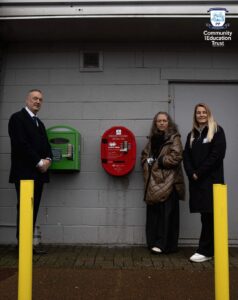Funding secured to continue violence prevention initiatives across Lancashire
Lancashire Violence Reduction Network, an existing collaboration across public sector agencies which works to reduce serious violence across the county, is set to receive government funding of £5 million to enable it to continue over the next three years.
The funding, secured through the Office of the Police and Crime Commissioner, coincides with the Government today publishing an evaluation of Violence Reduction Unit performance which shows that they are starting to have a positive impact in reducing violent crime.
Lancashire Violence Reduction Network was one of the original 18 Violence Reduction Units pioneering a new approach that brings together local partners in policing, education, health, and local government, to deepen understanding of the root causes of violence and put interventions in place. Those interventions shown to be the most successful are rolled out to other areas in the county.
Lancashire Police and Crime Commissioner, Andrew Snowden said:
“I’m delighted that we have secured funding that allows us to continue the ongoing work of the Violence Reduction Network across the county, tackling knife crime and other violent offences which, ultimately, keeps people safe.
“The Network pulls together partners to help identify issues and then work to solve them and prevent people offending, particularly reoffending. It also helps us support Lancashire Constabulary to make the county safer.
“The Violence Reduction Network will continue to play an important role as we deliver the Police and Crime Plan, work to cut violent crime and make our streets safer.”
Lancashire Constabulary Chief Constable Chris Rowley said:
“We must do more to reach those at risk of violence early on, to break the cycle of crime. No-one can do this alone. That’s why galvanising all parts of the public sector lies at the heart of many of our initiatives to tackle serious violence.
“As Lancashire Violence Reduction Network enters its fourth year, we hope today’s promise of continued funding will reassure the people across Lancashire that we will never let up in our efforts to keep them safe.”
Initiatives facilitated by Lancashire Violence Reduction Network include coaching programmes to reduce reoffending and improve the life chances of young people, knife crime education and prevention activity including the Knife Angel visit to Lancashire in November 2021, and work to bring trauma-informed practice into public services, called Trauma Informed Lancashire.
Other programmes sponsored assist in building parenting skills and emotional resilience. One dad who took part in the Caring Dads programme said:
“I’ve learnt the difference between what your feelings are, what your thoughts are and why your actions are, and how, if you change what you’re thinking, it’s going to change what you feel, and then it’s going to change the action. I used to take it out on people when they’ve done absolutely nothing wrong. If you change your thoughts before you enter that situation the outcomes and the actions are going to be different. So, that’s something I’ve learnt.”
The Emergency Department Navigator programme is now available in all emergency departments across Lancashire. The programme helps people, particularly those who arrive with violence related injuries, to access support services and provides non-judgemental support that continues after discharge. Similarly, the DIVERT intervention programme, which was initially based in police custody suites and has expanded into communities across Lancashire, provides coaching and access to services to help people make positive decisions for their future.
21-year old Sam* started an English as a second language (ESL) course at college, received support in managing his finances, secured a safe place to live and gained employment all with help from the DIVERT programme. Ongoing support from his DIVERT coach has helped him to improve his prospects and take positive steps away from circumstances that placed him at risk.
In addition to the extension of funding for the existing Lancashire Violence Reduction Network and building on previous Grip funding, Government have said that a further £2.4m will also be forthcoming for policing hotspot funding over three years. This will support policing activity involving regular, intensive, high-visibility foot patrols for short periods of time within specific areas where data analysis shows there is a risk of serious violence.
Grip funding also includes the twice-yearly Operation Sceptre week of intense police action against knife crime. In 2021, Operation Sceptre in Lancashire resulted in 1,257 weapons being taken off the streets, 92 arrests, 62 weapon sweeps, and 830 pupils receiving knife crime education, all over the two weeks the operation ran. This is in addition to the usual day-to-day anti-knife crime policing activity.
The monetary cost of violence in Lancashire is £346.9 million (2020/21), a figure that has reduced from £527.5 million in 2018/19.




